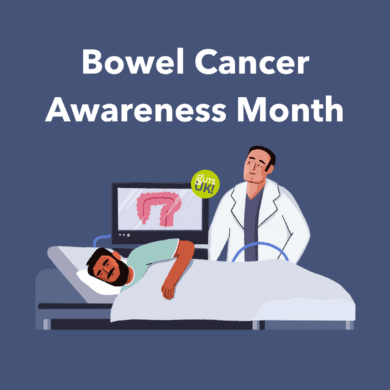Overview
Bowel cancer is one of the most common cancers in the UK. Almost 9 in 10 diagnoses are in people over 60. But, cases in younger individuals are increasing. If detected early, the cure rate exceeds 90%. In 2021, doctors diagnosed 49,385 people with bowel cancer in the UK.
The bowel lining undergoes continuous renewal. It has millions of tiny cells that grow, do their job, and then die. Each cell has genes that control how it behaves. Sometimes, gene faults make cells grow too fast. Gene changes may or may not be as a result of hereditary causes. This can lead to growths called polyps, which could be the first step on the road to cancer.
Causes
The causes of bowel cancer aren’t completely clear. However, some risk factors can raise the chance of developing it. You can change some factors. These include an unhealthy lifestyle for example low fibre intake, eating too much red or processed meat, a high unhealthy body weight, smoking, and excessive alcohol use. Others are unchangeable and can lead to bowel cancer by chance.
Unchangable risk factors include:
- Being over 50
- A strong family history of bowel cancer
- Type 2 diabetes
- Long-term inflammatory bowel disease (Crohn’s disease or ulcerative colitis)
- Polyps in the bowel
These factors don’t mean you will definitely get cancer. Just as not having the risk factors and following a healthy lifestyle doesn’t mean you can’t get cancer.
How bowel cancer develops
Most bowel cancers start as benign (non cancerous) polyps. These polyps begin as small bumps of cells in the bowel. Some polyps stay small, but others grow bigger over time. They can do this without turning cancerous. In some polyps, the genetic instructions can become disordered. This leads to disorganised cell growth, which can make the polyp cancerous (malignant). They grow on the bowel wall and can then extend through the bowel lining.
Most polyps are harmless. However, about 1 in 10 can turn into cancer. Larger polyps have an even greater risk. Polyps smaller than 10mm are unlikely to be cancerous. Taking out benign polyps can help stop cancer from developing later.
Can bowel cancer be hereditary?
If someone is diagnosed with bowel cancer before age 50, or has a strong family history, they might have an inherited genetic abnormality. This could be Lynch syndrome, which raises the risk of cancer. There are other rare inherited conditions, for example familial adenomatous polyposis (FAP). This condition leads to many bowel polyps and increases the risk of cancer. Where these conditions happen, brothers, sisters and children of the person identified can see a specialist for advice. Some may need regular colonoscopies. Families at risk may need referral to a specialist for blood testing to check for inherited conditions.
Symptoms
A polyp can take five to ten years to turn into bowel cancer. Often, there are no early symptoms. Common symptoms include:
- Bowel bleeding.
- Blood in poo.
- Dark poo.
- Persistent unusual changes in bowel habits (diarrhoea/constipation).
- Belly (abdominal) pain.
- Anaemia (which can cause tiredness).
- Unintentional weight loss.
- A noticeable belly (abdominal) lump.
Bowel cancer can grow and occasionally block the bowel. This can lead to pain, constipation, and bloating. If you notice any changes in your bowel habits that last four weeks or more, talk to a doctor. This is important even if you already have a bowel condition. It might not require an invasive test like a colonoscopy.
If your family has a history of bowel cancer, talk to your doctor within a few weeks of any changes. Early detection is crucial for effective treatment. Waiting too long can hinder chances of cancer removal. The FIT test (see below) can help to detect cancer even without symptoms.
Diagnosis
Doctors may find lumps during an abdominal or rectal examination, but tests are usually necessary. Common tests include:
- Flexible Sigmoidoscopy. A doctor inserts a thin tube with a camera at the end through the anus after an enema clears the lower bowel. This is used to see the lower part of the bowel.
- Colonoscopy. A flexible tube is inserted via the anus to examine the entire large bowel after laxatives are taken by mouth. The procedure can be uncomfortable so sedation may be used.
- CT Colonography/CT Pneumocolon. Carbon dioxide fills the bowel after laxatives are used to clear it. Carbon dioxide lines the bowel and contrast dye can be used for clearer CT images. The dye is given by injection.
- Colon Capsule. A tiny camera the size of a vitamin pill gets swallowed and takes pictures as it moves through the bowel. It needs some bowel preparation, but it doesn’t involve anal insertion of the camera. This test part of an NHS study and isn’t available everywhere.
Both sigmoidoscopy and colonoscopy can take tissue samples (biopises) during the test. Which test is used depends on the person’s symptoms and the test availability.
What is bowel cancer screening?
Polyps can bleed. This is why poo is tested for hidden blood during screening. A positive result means more bowel tests. Studies show screening tests find more early-stage cancers, which improves survival rates. You need to be registered with a GP to receive the test kit.
In the UK, mass bowel cancer screening includes:
- England: Everyone aged 54-74 gets a test every 2 years. Soon, this will expand to include those aged 50 and above.
- Scotland and Wales: Individuals aged 50-74 get a test every 2 years.
- Northern Ireland: Screening is for those aged 60-74 every 2 years.
If you don’t have a permanent address in England, ask your GP to send your test kit to the surgery or another address. If you don’t have a GP call the helpline in England on 0800 707 60 60, In Wales, call 0800 294 3370. In Scotland contact 0800 0121 833. In Northern Ireland, dial 0800 015 2514.
People over 75 in England and Scotland can ask for kits every 2 years. Just call the helplines: 0800 707 60 60 for England and 0800 012 1833 for Scotland. There is no service for this age group in Wales or Northern Ireland. If you notice symptoms, consult your GP.
Due to COVID-19 backlogs, there may be delays in receiving test kits. If your kit hasn’t arrived on time, contact the helpline.
The screening uses the faecal immunochemical test (FIT). This test finds hidden blood in poo. It doesn’t diagnose bowel cancer directly. However, it can indicate a higher risk of polyps or cancer. This might lead to a colonoscopy. If you have symptoms, see your GP, even if past tests were negative. A positive test doesn’t always mean cancer. Blood in poo can come from other issues, like haemorrhoids (piles) or inflammatory bowel disease.
People at higher risk of bowel cancer might have a direct colonoscopy instead of a stool test. This includes people with:
- Lynch syndrome
- Familial adenomatous polyposis (FAP)
- A strong family history of bowel cancer (either a close relative who was diagnosed before age 50, or three or more close relatives who have been diagnosed)
- Long-standing inflammatory bowel disease
- A history of bowel cancer or polyps
How to do the FIT bowel cancer screening test
How to do the bowel cancer screening test in Scotland
How to do the bowel cancer screening test in Wales
How to do the bowel cancer screening test in Northern Ireland
Watch a video on how to use the test kit in Sylheti (Bengali).
Watch a video on how to use the test kit in Urdu.
Treatment
For information on polyp treatment from Guts UK, email info@gutscharity.org.uk or call 020 7486 0341.
Cancer Evaluation & Treatment
Most cancers need a team of specialists to assess them. It is called an multidisciplinary team (MDT). It includes specialist doctors and other healthcare professionals specialised in bowel cancer.
Surgery
Bowel cancer usually gets treated with surgery. The surgeon takes out the affected part of the bowel and the lymph glands. Often, the two ends of the bowel are reconnected (anastomosis). The surgery is often done using key-hole techniques to speed up recovery time. You can live without some of your bowel. The effects of surgery can vary for each person. If the bowel can’t be joined, or if it’s an emergency, a colostomy might be needed.
For advanced and secondary cancer, surgery might also be offered.
Colostomy (Stoma)
Stomas can be either temporary or permanent. This depends on different factors. Temporary stomas are made so the bowel can heal after joining it together. It can be reversed a few months later to restore normal bowel flow.
In people where a rectal cancer is near the anal canal, a permanent stoma may be needed. The rectum and anus are taken out. The end of the bowel is then turned into a permanent opening in the abdomen. Poo is then collected in a bag attached to the skin. Permanent stomas may also be necessary for frail individuals, if cancer has spread, or if someone prefers a stoma. Permanent stomas are much rarer nowadays. A stoma nurse will provide guidance on stoma care.
Stenting
If bowel cancer causes a blockage, a stent may be placed during a colonoscopy to open the bowel. This allows poo to pass through. This procedure can provide time to plan surgery, or to relieve symptoms if surgery isn’t possible.
Chemotherapy or Radiotherapy
The MDT will decide if radiotherapy or chemotherapy can shrink the cancer before surgery. This can often improve the cancer outcome. Chemotherapy is a drug treatment. It comes in tablets and infusions. People usually receive it in the hospital on an outpatient basis. Treatment will usually be given Monday to Friday for five weeks. Then, there will be a 12-week break. The person will then be rescanned. The colorectal MDT will then discuss it and decide on surgery.
Sometimes, the cancer shrinks and might even ‘disappear’ completely. Doctors will set up regular sigmoidoscopies for these people to ensure careful follow-up.
Chemotherapy can also be used after surgery to mop up any cells that may be in the bloodstream. This is called adjuvant chemotherapy.
Staging and Post-Surgery Treatment
Doctors will check the tumour to determine the cancer stage. The cancer stage will impact future treatment choices and the likelihood of a cure. Bowel cancer caught early has a greater than 9 in 10 chance of a cure. The MDT will meet to decide the next steps. If more treatment, like chemotherapy, is needed it will be arranged.
How will I be monitored over time?
Healthcare professionals will typically check in with people for 5 years if no more treatment is needed. The follow-up may include clinic appointments, blood tests, colonoscopies, and scans. The follow-up may be different for those with hereditary cancer, such as Lynch Syndrome. If the cancer does come back, there are still many ways to achieve a positive outcome.
How can I prevent the cancer from coming back?
Living healthily can lower the chance of recurrence. This includes eating a healthy diet and exercising regularly. A positive attitude and attending follow-up appointments also help.
People with Lynch syndrome might be advised to take aspirin to prevent recurrence. Always consult your doctor about preventive measures. You can find a tool to help you decide here: Patient decision aid on lynch syndrome and aspirin.
What is secondary bowel cancer?
Secondary bowel cancer occurs when a tumour spreads from the bowel to nearby tissues and other parts of the body. It spreads through the blood and lymph systems, often to the liver and lungs. This is called advanced cancer. It might have happened when the cancer is diagnosed, or it can happen later. These are called secondaries or ‘metastasis.’
How is secondary bowel cancer treated?
Treatment options for secondary bowel cancer have improved a lot. Your cancer team can explain the benefits and side effects of treatments:
- While it does not cure the disease, it helps control symptoms and can prolong life by shrinking secondary tumours.
- Surgery may be possible if the tumour blocks the bowel or if there are few small secondary tumours. Sometimes, doctors remove part of the liver to eliminate secondaries in a specific area. Radiofrequency ablation uses high-frequency waves to destroy cancer cells.
- It uses high-energy waves to destroy cancer cells. It can also help manage symptoms, especially for rectal cancer.
- Targeted Treatments: Monoclonal antibodies and angiogenic drugs focus on certain cancer cells. This treatment can also reduce the tumour’s ability to develop a new blood supply.
- Teaches the immune system to spot and eliminate cancer cells, working well in certain situations.
Ask your doctor if you would benefit from these treatments.
Support
What happens if bowel cancer is diagnosed?
After diagnosis, the team reviews biopsies, blood tests, and scans in a Multi-Disciplinary Team (MDT) meeting. This results in a personalised management plan. The oncologist or bowel cancer surgeon will explain this decision to you and answer any questions. A clinical nurse specialist (colorectal nurse) will help you during your treatment journey. The colorectal nurse supports individuals with bowel cancer during this difficult time and is the primary contact throughout.
What to ask your doctor?
People with bowel cancer should feel free to ask their team any questions about their diagnosis and treatment. It often helps to make a list of questions for your doctor or nurse. Bringing a friend or family member for support to the appointment can also be beneficial.
Other support resources
If you would like a printed copy of any links provided contact Guts UK on info@gutscharity.org.uk or call 0207 486 0341.
The National Institute for Health and Care Excellence (NICE) provides guidelines and quality standards on bowel cancer treatment. You can find more help from Macmillan Cancer Support online or by calling 0800 808 00 00. Help is also available from Cancer Research UK online or by calling 0300 123 1022. You can find out more from Bowel Cancer UK too.
Research
New surgical techniques and chemotherapy drugs are always being explored. Early research on cancer vaccines and targeted therapies seeks to enhance treatment results. Research is underway to improve population screening tests for earlier cancer detection.
The COLO-COHORT study, funded by Guts UK, aims to create a tool to spot people at higher risk of bowel cancer. It looks at age, lifestyle, genetic factors and the gut microbiome to take a complete view.
Help us to continue funding life-changing research by donating today.Discover more:
Copyright © 2026 Guts UK. This leaflet was published by Guts UK in April 2025 and will be reviewed in April 2028. The leaflet was written by Guts UK and reviewed by experts in bowel cancer and has been subject to both lay and professional review. All content in this leaflet is for information only. The information in this leaflet is not a substitute for professional medical care by a qualified doctor or other healthcare professional. We currently use AI translation tools on our website, which may not always provide perfect translations. Please check for further explanation with your doctor if the information is unclear. ALWAYS check with your doctor if you have any concerns about your health, medical condition or treatment. The publishers are not responsible or liable, directly or indirectly, for any form of damages whatsoever resulting from the use (or misuse) of information contained or implied in this leaflet. Please contact Guts UK if you believe any information in this leaflet is in error.



